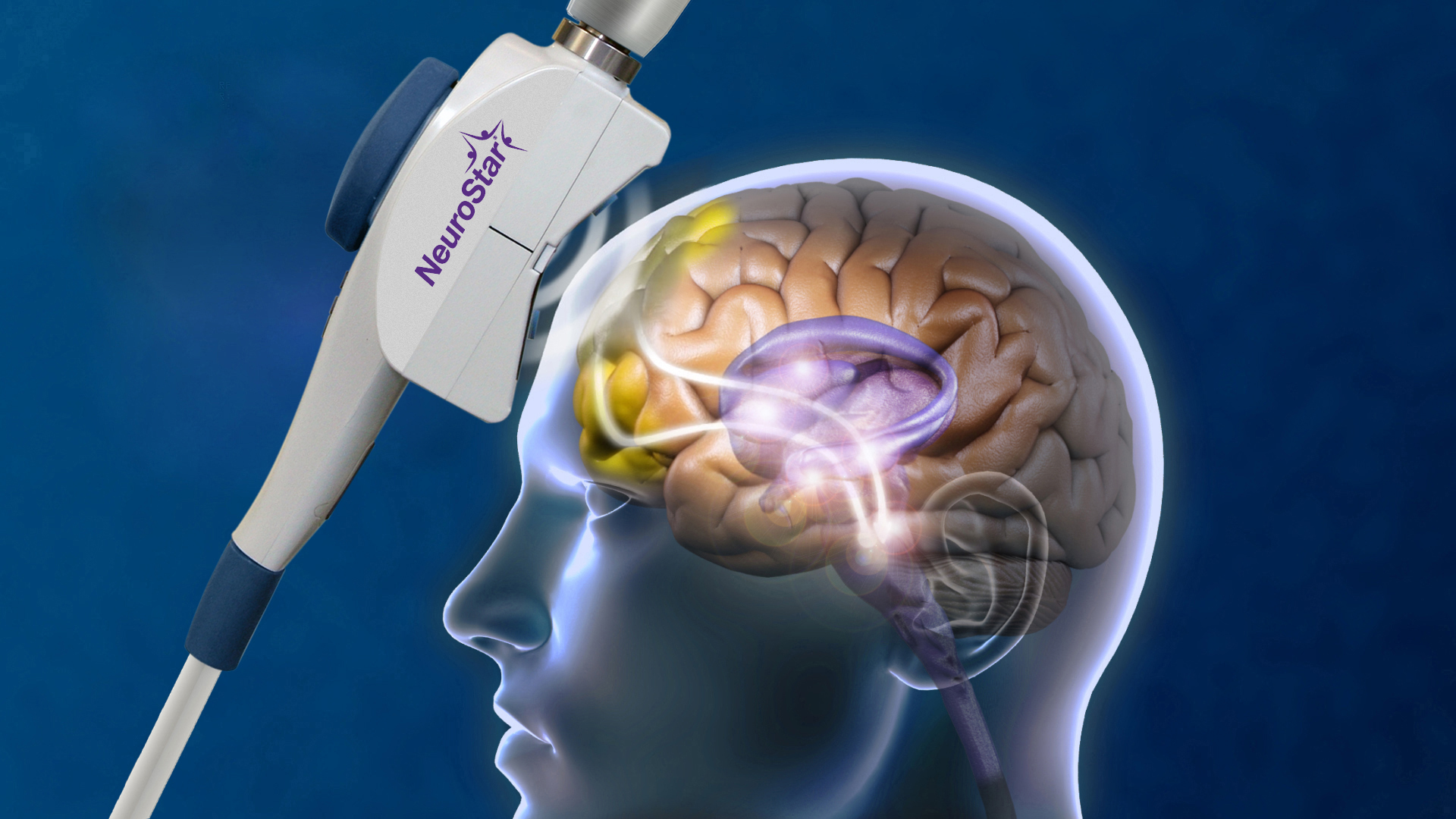How NeuroStar TMS Therapy Works
A NeuroStar TMS treatment session is a short outpatient procedure that lasts about 37 minutes.
During treatment, you can relax in the spa chair, watch TV, read a book, or listen to music. You may also choose to visit with the TMS Clinical Coordinator, who will remain with you to monitor the treatment session. After the treatment session, you can immediately return to your normal daily routine.
What is NeuroStar TMS?
NeuroStar Transcranial Magnetic Stimulation or NeuroStar TMS is the first NeuroStar TMS Treatment System approved by the Food and Drug Administration (FDA), for the treatment of depression. NeuroStar TMS does not require surgery or medication. NeuroStar TMS is safe and effective. While you recline in a spa chair, the NeuroStar TMS magnet gently sits on your head and sends low-dose magnetic pulses to the parts of the brain associated with depression. Once you have completed your treatment session, you can resume your normal daily activities.
The treatment has a strong safety profile without the side-effects associated with most anti-depressant medications. This is because the treatment is applied topically to a specific area and is not systemic like medications. Based on the safety and efficacy of NeuroStar TMS, the FDA guidelines suggest NeuroStar TMS Treatment as a second line treatment after as little as one anti-depressant failure.
NeuroStar TMS is short pulses of magnetic energy applied to the area of brain tissue responsible for mood regulation (Limbic System). These magnetic fields are the same type and strength as those used in magnetic resonance imaging (MRI) machines. The unique nature of magnetic fields allows them to pass through the skull and into the cortex without being distorted in any way. This facilitates a very focal stimulation and minimizes stimulation of non-associated brain tissues. The amount of impulse created in the brain is very small and specifically calibrated to each patient during their first treatment session.
The objective of NeuroStar TMS treatment is to stimulate neurotransmitter release. The neurons respond to the NeuroStar TMS pulses and become more active. Specifically, NeuroStar TMS targets the circuits of the brain that have been underactive during depression, and restores them to a more healthy and functional level of activity. Patients remain awake and alert during a NeuroStar TMS Treatment session.
The typical course of treatment consists of 36 sessions over an 8-week period for the treatment of depression. Many insurance companies have been covering a significant portion of the treatment and this trend is increasing. Your coverage will depend on your insurance company's specific coverage guidelines, as well as submission of required documentation. Our staff has experience helping our patients navigate the insurance reimbursement process and would be glad to assist you.

Why NeuroStar TMS?
Patients that have suffered from depression for long periods of time with limited response to medication trials, have shown substantial long-term positive results from NeuroStar TMS Treatment.
Some patients also look to NeuroStar TMS Treatment when they have other medical conditions, prefer non-medication alternatives, or are on certain medications that would not be compatible with anti-depressant therapy.
The good news is...many patients who have not found relief from depression with first-line treatment options have shown significant clinical response and often reach clinical remission with NeuroStar TMS Treatment.

Is NeuroStar TMS Right for Me?
NeuroStar TMS treatment has been shown to be very effective in patients who have failed multiple trials of medication and therapy.
Understanding Medication Trials
The goal of the STAR*D studies conducted by NIMH (National Institute of Mental Health) was to assess the effectiveness of depression treatments. It was determined that first line anti-depressants were effective for approximately 27.5% of the patients. Because this is an in-expensive and relatively effective treatment modality, doctor's will usually begin the treatment of depression with a medication trial. The patients that do not respond to the initial medication treatment historically are prescribed a second class of anti-depressant. Unfortunately, only 21.2% of these patients are likely to experience a response. The likelihood of reaching remission with subsequent medication trials only decreases.
In the FDA trials, over 10,000 active NeuroStar TMS treatments performed on depressed patients who had failed medication trials at institutions such as the Mayo Clinic, Columbia University, and Stanford University have shown that approximately 1 in 2 patients treated with NeuroStar TMS experienced significant improvement in their symptoms of depression. Throughout the NeuroStar TMS trials, 1 in 3 patients experienced complete relief from their depression at the end of six weeks of treatment. At Tranquility TMS Center we have observed clinical remission in 83.3% of patients treated in our facility. These results make NeuroStar TMS an exciting and effective treatment option for medication resistant patients.
How It Works
To most effectively administer treatment, Dr. Martin will first perform an assessment to identify your motor threshold. This test is important because it identifies the magnetic field strength that will be used in your treatment. This field strength is customized for each patient to deliver the most effective treatment dose.
During this initial procedure, Dr. Martin will determine the position where the NeuroStar TMS treatment should be applied for optimal response and is patient specific.
After the initial treatment appointment, routine NeuroStar TMS Therapy will be administered over 35 additional sessions. The sensor will deliver rapid magnetic pulses in a series of intervals. These pulses will feel like tapping on your scalp. Initially, some patients may find this tapping uncomfortable; however, most patients observe that any discomfort has completely resolved after the first few treatment sessions.

Learn more... call 210-509-6000 to discuss how NeuroStar TMS Treatment can help improve your depression symptoms and your life.
